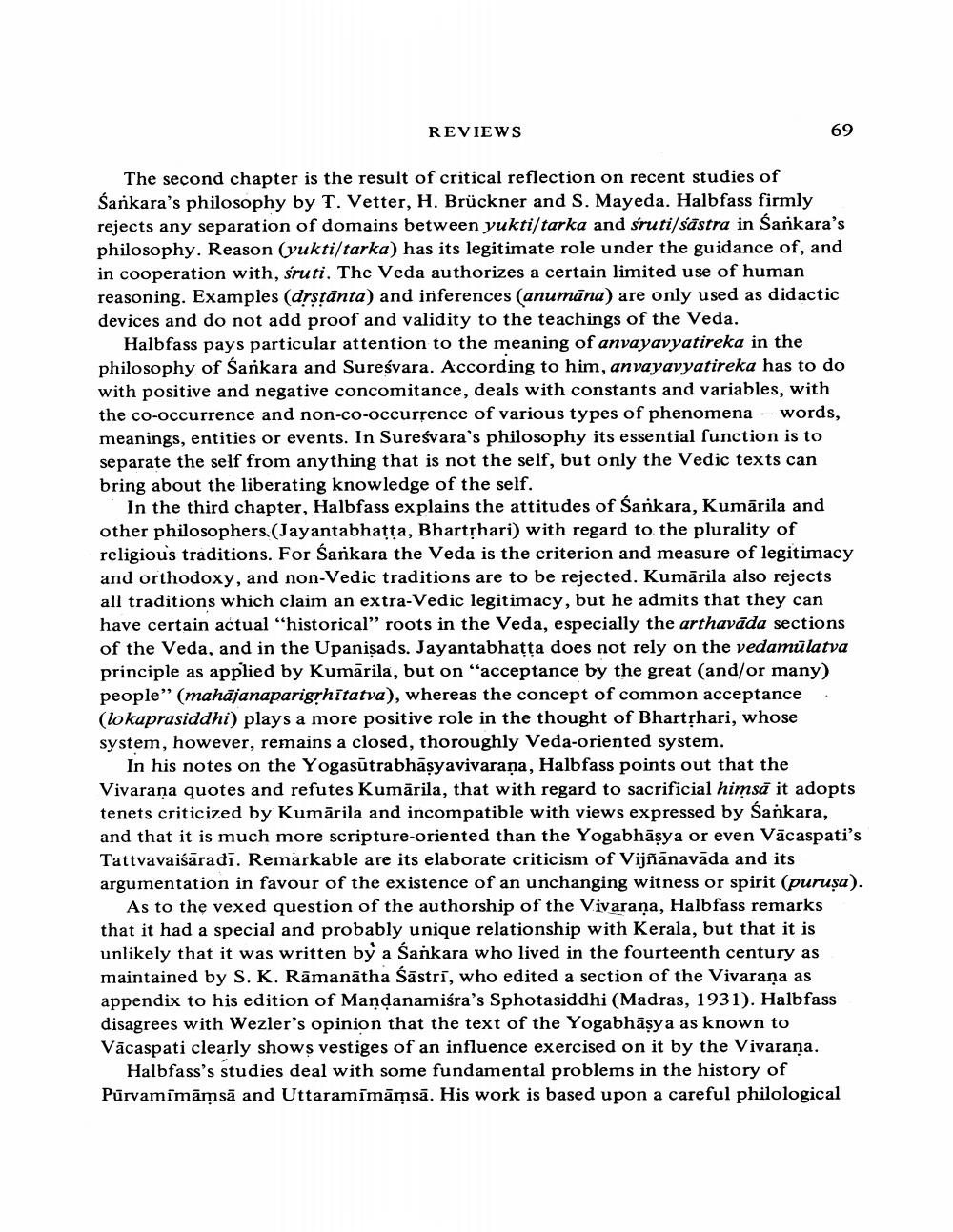Book Title: Book Reviews Author(s): J W De Jong Publisher: J W De Jong View full book textPage 3
________________ REVIEWS The second chapter is the result of critical reflection on recent studies of Śarkara's philosophy by T. Vetter, H. Brückner and S. Mayeda. Halbfass firmly rejects any separation of domains between yukti/tarka and sruti/sästra in Sankara's philosophy. Reason (yukti/tarka) has its legitimate role under the guidance of, and in cooperation with, sruti. The Veda authorizes a certain limited use of human reasoning. Examples (drstānta) and inferences (anumāna) are only used as didactic devices and do not add proof and validity to the teachings of the Veda. Halbfass pays particular attention to the meaning of anvayavyatireka in the philosophy of Sankara and Sureśvara. According to him, anvayavyatireka has to do with positive and negative concomitance, deals with constants and variables, with the co-occurrence and non-co-occurrence of various types of phenomena - words, meanings, entities or events. In Sureśvara's philosophy its essential function is to separate the self from anything that is not the self, but only the Vedic texts can bring about the liberating knowledge of the self. In the third chapter, Halbfass explains the attitudes of Sarkara, Kumārila and other philosophers (Jayantabhatta, Bhartshari) with regard to the plurality of religious traditions. For Sankara the Veda is the criterion and measure of legitimacy and orthodoxy, and non-Vedic traditions are to be rejected. Kumärila also rejects all traditions which claim an extra-Vedic legitimacy, but he admits that they can have certain actual "historical" roots in the Veda, especially the arthavāda sections of the Veda, and in the Upanişads. Jayantabhatta does not rely on the vedamülatva principle as applied by Kumarila, but on "acceptance by the great (and/or many) people" (mahājanaparigļhitatva), whereas the concept of common acceptance. (lokaprasiddhi) plays a more positive role in the thought of Bhartshari, whose system, however, remains a closed, thoroughly Veda-oriented system. In his notes on the Yogasūtrabhasyavivarana, Halbfass points out that the Vivarana quotes and refutes Kumārila, that with regard to sacrificial himsā it adopts tenets criticized by Kumārila and incompatible with views expressed by Sankara, and that it is much more scripture-oriented than the Yogabhāsya or even Vācaspati's Tattvavaiśaradi. Remarkable are its elaborate criticism of Vijñānavāda and its argumentation in favour of the existence of an unchanging witness or spirit (purusa). As to the vexed question of the authorship of the Vivarana, Halbfass remarks that it had a special and probably unique relationship with Kerala, but that it is unlikely that it was written by a Sankara who lived in the fourteenth century as maintained by S. K. Rāmanātha Šāstrī, who edited a section of the Vivarana as appendix to his edition of Mandanamiśra's Sphotasiddhi (Madras, 1931). Halbfass disagrees with Wezler's opinion that the text of the Yogabhāsya as known to Vācaspati clearly shows vestiges of an influence exercised on it by the Vivarana. Halbfass's studies deal with some fundamental problems in the history of Pūrvamīmāmsā and Uttaramīmāmsā. His work is based upon a careful philologicalPage Navigation
1 2 3 4 5 6 7 8 9 10 11 12 13 14 15 16 17 18 19 20 21 22 23 24 25 26 27 28 29 30 31 32 ... 48
